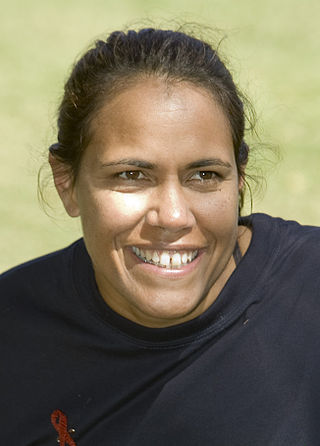
The Gubbi Gubbi people, also known as Kabi Kabi, are an Aboriginal Australian people native to south-eastern Queensland. They are now classified as one of several Murri language groups in Queensland.

Wujal Wujal, sometimes spelt Wudjil Wudjil, is a rural town and locality in the Wujal Wujal Aboriginal Shire, Queensland, Australia. It is an Aboriginal community. In the 2021 census, the locality of Wujal Wujal had a population of 276 people.
The Bigambul people are an Aboriginal Australian people of the Northern Tablelands and Border Rivers regions of New South Wales and Queensland.

The Kuku Yalanji, also known as Gugu-Yalanji, Kuku Yalandji or Kokojelandji, are an Aboriginal Australian people originating from the rainforest regions of Far North Queensland.

The Tharawal people and other variants, are an Aboriginal Australian people, identified by the Yuin language. Traditionally, they lived as hunter–fisher–gatherers in family groups or clans with ties of kinship, scattered along the coastal area of what is now the Sydney basin in New South Wales.
The Gidabal, also known as Kitabal and Githabul, are an indigenous Australian tribe of southern Queensland, who inhabited an area in south-east Queensland and north-east New South Wales, now within the Southern Downs, Tenterfield and Kyogle Local Government regions.

The Kuku Nyungkal people are a group of Aboriginal Australians who are the original custodians of the coastal mountain slopes, wet tropical forests, waters, and waterfalls of the Upper Annan River, south of Cooktown, Queensland

The Annan River is a river in the Wet Tropics of Far North Queensland, Australia.
The Kuku Nyungkal dialect is an Australian Aboriginal language and the language of the Kuku Nyungkal people of Far North Queensland. It is a variety of Kuku Yalanji still being spoken. Most of the speakers today live in the communities of Wujal Wujal and Mossman.
The Barungguan are an Aboriginal Australian people of the Cape York Peninsula of Northern Queensland. The name is associated with three languages: Ganganda, Umpithamu and Morrobolam.
The Pakadji people, also known by the southern tribal exonym as the Koko Yao, are an Aboriginal Australian group of Cape York Peninsula in northern Queensland. The ethnonym Koko Yaʼo is said literally to mean " talk, speech" (koko/kuku) 'this way' (yaʼo), though this has been questioned.

The Uutaalnganu people, also known as Night Island Kawadji, are an Aboriginal Australian group of Cape York Peninsula in northern Queensland. The name is also used collectively for several peoples in this area, such as the Pontunj / Jangkonj (Yanganyu), whose language is unconfirmed.
The Kokokulunggur are an indigenous Australian people of North Queensland.
The Mutumui were an indigenous Australian people of northern Queensland.
The Wulpura were an indigenous Australian people of the state of Queensland. Their language, Kuku Waldja, has been listed as a dialect of Kuku Yalanji, but there does not appear to be any data available.
The Laia were an indigenous Australian people of the state of Queensland.
The Wakaman people, also spelt Wagaman, are an Aboriginal Australian people of the state of Queensland. According to some authorities, they may be interchangeable with the group identified by ethnographers as the Agwamin.
The Yagalingu are an Aboriginal Australian people of the state of Queensland. Their language may have been a dialect of Bidjara.
The KunjaPeople are an Indigenous Australian people of southwest Queensland.
The Kukatj are an Aboriginal Australian people of the Cape York Peninsula in the state of Queensland. They are to be distinguished from the Kukatja of Western Australia and the Luritja of the Northern Territory, who have also historically been known as Kukatja.